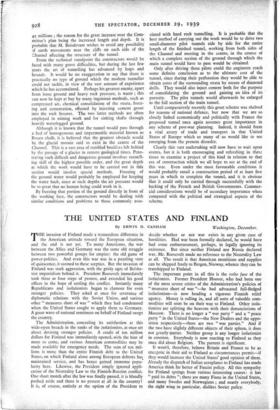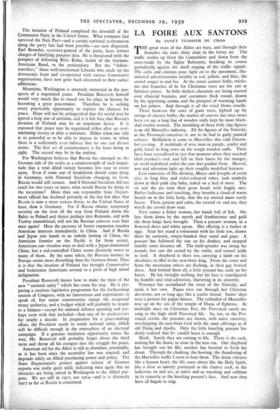THE UNITED STATES AND FINLAND
By ERWIN D.
THE invasion of Finland made a tremendous difference in the American attitude toward the European situation, and the end is not yet. To many Americans, the war between the Allies and Germany was the same old struggle between two powerful groups for empire: the old game of power-politics. And even this war was in a puzzling state of quiescence, it seemed to these sceptics. But the invasion of Finland was stark aggression, with the grisly ogre of Bolshe- vist imperialism behind it. President Roosevelt immediately took three or four steps of protest, and extended his good offices in the hope of settling the conflict. Instantly many Republicans and isolationists began to clamour for even stronger policies. They asked at once for severance of diplomatic relations with the Soviet Union, and various other " measures short of war " which they had condemned when the United States sought to apply them to Germany. A great wave of national sentiment on behalf of Finland swept the country.
The Administration, concealing its satisfaction at this wide-open breach in the ranks of the isolationists, at once set about devising stronger policies. A credit of ten million dollars for Finland was immediately opened, with the hint of more to come, and various American commodities may be made available for emergency needs. The sum of ten mil- lions is more than the entire Finnish debt to the United States, on which Finland alone among European debtors has, maintained service, and has hence gained immense popu- larity here. Likewise, the President simply ignored appli- cation of the Neutrality Law to the Finnish-Russian conflict. One short month after the law was finally passed, it is blandly pushed aside and there is no protest at all in the country ! It is, of course, entirely at the option of the President to decide whether or not war exists in any given case of hostilities. Had war been formally declared, he would have had some embarrassment, perhaps, in legally ignoring its existence. But since neither Finland nor Russia declared war, Mr. Roosevelt made no reference to the Neutrality Law at all. The result is that American munitions and supplies can be shipped freely to Bergen, Norway, whence they can be transhipped to Finland.
The important point in all this is the volte face of the isolationists. Former President Hoover, who had been one of the most severe critics of the Administration's policies of " measures short of war "—he had advocated full-fledged isolationism—is now heading a vigorous Finnish relief agency. Money is rolling in, and all sorts of valuable com- modities will soon be on their way to Finland. Other isola- tionists are splitting the heavens with their denunciations of Moscovi. There is no longer a " war party " and a " peace party " in the United States—the New Dealers and the oppo- sition respectively—there a,re two " war parties." And if the two have slightly different objects of their spleen, it does not greatly matter. Neither group is any longer isolationist in emotion. Everybody is now reacting to Finland as they once did about Belgium. The portent is significant. It would, therefore, behove Britain and France to be as energetic in their aid to Finland as circumstances permit—if they would increase the United States' good opinion of them. Already the dispatch of Italian aeroplanes to Finland has made America think far better of Fascist -policy. All this sympathy for Finland springs from various interesting causes : it has " paid its debts "; there are many Finns in the United States, and many Swedes and Norwegians ; and nearly everybody, the right wing in particular, dislikes Soviet policy. The invasion of Finland completed the downfall of the Communist Party in the United States. What remnants had survived the Nazi Pact—and a certain scattered re-formation along the party line had been possible—are now dispersed. Earl Browder, secretary-general of the party, faces serious charges of falsifying passport data. He is threatened with the prospect of following 'Fritz Kuhn, leader of the German- American Bund, to the penitentiary. But the " fellow- travellers," those well-intentioned Liberals who made up the democratic front and co-operated with various Communist organisations, have now gone back chastened to their earlier affiliations.
Meantime, Washington is intensely interested in the pro- spects of a negotiated peace. President Roosevelt himself would very much like to round out his place in history by becoming a great peacemaker. Therefore he is seeking every practicable opportunity to explore the chances for peace. Hope will not be extinguished that the world may be spared a long war of attrition, and it is felt here that Russia's invasion of Finland may be an important factor. It is reasoned that peace may be negotiated either after an over- whelming victory or after a stalemate. Either when one side is so powerful as to be able to impose its terms, or when there is a sufficiently even balance that no one can dictate terms. The first set of circumstances is far from being in sight. The second may be in the making.
For Washington believes that Russia has emerged on the German side of the scales as a counterweight of such magni- tude that a total allied victory becomes less easy to count upon. Even if some sort of breakdown should come along in Germany, with National Socialism changing its form, Russia would still remain. And if National Socialism did not crack for two years or more, what would Russia be doing in the meantime? More than one responsible State Depart- ment official has declared privately in the last few days that Rusiia is now a more serious threat, to the United States at least, than is Germany. For if Russia obtains temporary security on the west all the way from Finland down the Baltic to Poland and thence perhaps into Rumania, and with Turkey immobilised, will not the Russian colossus turn East once again? Here the pressure of Soviet expansion touches American interests immediately, in China. And if Russia and Japan join hands in an unholy looting of China, the American frontier on the Pacific is far from secure. Americans can visualise ways to deal with a Japan-dominated China, but a red-controlled China seems distinctly worse to many of them. By the same token, the Russian menace in Europe seems more disturbing than the German threat. Thus it is that the invasion of Finland has brought Conservative and Isolationist Americans around to a pitch of high moral indignation.
President Roosevelt knows how to make the most of the new " national unity " which has come his way. He is pre- paring a cautious legislative programme for the forthcoming session of Congress, with no innovations and experiments to speak of, few major controversies except the reciprocal treaty authority, and a budget which will probably be nearer to a balance—except for national defence spending and per- haps even with that included—than any of its predecessors for nearly a decade. In preparation for a peace-making effort, the President needs to retain national unity, which will be difficult enough in the atmosphere of an electoral campaign. If a genuine mediation opportunity comes his way, Mr. Roosevelt will probably forget about the third term and throw all his energies into the struggle for peace. American aid for the Allies is still as abundant, potentially, as it has been since the neutrality law was enacted, and depends solely on Allied purchasing power and policy. The State Department's protest against seizure of German exports was really quite mild, indicating once again that no obstacles are being raised in Washington to the Allied pur- pose. We are still in 1917, not 1914—and is is distinctly 1917 as far as Russia is concerned.































 Previous page
Previous page